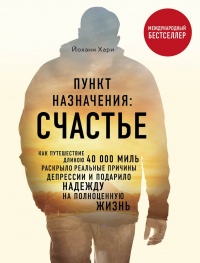Украденный фокус. Почему мы страдаем от дефицита внимания и как сосредоточиться на самом важном - Йоханн Хари
Книгу Украденный фокус. Почему мы страдаем от дефицита внимания и как сосредоточиться на самом важном - Йоханн Хари читаем онлайн бесплатно полную версию! Чтобы начать читать не надо регистрации. Напомним, что читать онлайн вы можете не только на компьютере, но и на андроид (Android), iPhone и iPad. Приятного чтения!
Шрифт:
Интервал:
Закладка:
149. Mullainathan et al., ‘Poverty impedes cognitive function’.
150. J. Howego, ‘Universal income study finds money for nothing won’t make us work less’, New Scientist, 8 February 2019. www.newscientist.com/article/2193136-universal-income-study-fi nds-money-for-nothing-wont-make-usworkless.
151. B. Cotton, ‘British employees work for just three hours a day’, Business Leader, 6 February 2019. www.businessleader.co.uk/british-employees-workfor-just-three-hours-a-day/59742.
152. Я взял эти сведения из рукописи статьи, которую любезно предоставила в мое распоряжение профессор Хелен Дилани из Оклендского университета.
153. A. Harper, A. Stirling and A. Coote, The Case For a Four Day Week (London: Polity, 2020), p. 6.
154. K. Paul, ‘Microsoft Japan tested a four day work week and productivity jumped by 40 %’, Guardian, 4 November 2019. www.theguardian.com/technology/2019/nov/04/microsoft-japan-four-day-work-week-productivity; Harper et al., The Case For a Four Day Week, p. 89.
155. Harper et al., The Case For a Four Day Week, pp. 68–71.
156. Ibid., pp. 17–18.
157. K. Onstad, The Weekend Effect (New York: HarperOne, 2017), p. 49.
158. M. F. Davis and J. Green, ‘Three hours longer, the pandemic workday has obliterated work-life balance’, Bloomberg, 23 April 2020. www.bloomberg.com/news/articles/2020-04-23/working-from-home-in-covidera-means-three-more-hours-on-the-job;
Webber, Working at home has led to longer hours’, Personnel Today, 13 August 2020. www.personneltoday.com/hr/longer-hours-and-loss-of-creative-discussionsamong-home-working-side-eff ects/; ‘People are working longer hours during the pandemic’, The Economist, 24 November 2020. www.economist.com/graphic-detail/2020/11/24/people-are-working-longerhours-during-the-pandemic.
Friedman, ‘Proof our work-life balance is in danger (but there’s hope)’, Atlassian, 5 November 2020. www.atlassian.com/blog/teamwork/data-analysis-length-of-workday-covid.
159. F. Jauren Guiberry, ‘Denconnexion volontaire aux technologies de l’information et de la communication’, Rapport de recherche, Agence Nationale de la Recherche, 2014, hal-00925309. hal.archives-ouvertes.fr/hal-00925309/document.
160. R. Haridy, ‘The right to disconnect: the new laws banning after hours work emails’, New Atlas, 14 August 2018. www.newatlas.com/right-to-disconnect-after-hours-workemails/55879/, citing W. J. Becker, L. Belkin and S. Tuskey, ‘Killing me softly: Electronic communications monitoring and employee and spouse well-being’, Academy of Management Annual Meeting Proceedings, 2018 (1), 2018.
161. ‘Sleep and tiredness’, NHS web-page. www.nhs.uk/live-well/sleep-and-tiredness/eight-energy-stealers.
162. M. Pollan, In Defence of Food (London: Penguin, 2008), pp. 85–9.
163. L. Pelsser et al., ‘Effect of a restricted elimination diet on the behaviour of children with attention-deficit hyperactivity disorder (INCA study): a andomized controlled trial’, Lancet, 377, 2011, pp. 494–503;
J. K. Ghuman, ‘Restricted elimination diet for ADHD: the INCA study’, Lancet, 377, 2011, pp. 446–8.
164. Donna McCann et al., ‘Food additives and hyperactive behaviour in 3-year-old and 8/9-year-old children in the community: a andomized, double-blinded, placebo-controlled trial’, Lancet, 370, 2007, pp. 1, 560–67;
B. Bateman et al., ‘The eff ects of a double blind, placebo controlled, artificial food colourings and benzoate preservative challenge on hyperactivity in a general population sample of preschool children’, Archives of Disease in Childhood, 89, 2004, pp. 506–11.
См. также: M. Wedge, A Disease Called Childhood: Why ADHD Became an American Epidemic (New York: Avery, 2016), pp. 148–59.
165. Joel Nigg, Getting Ahead of ADHD, p. 59.
166. B. A. Maher, ‘Airborne Magnetite– and Iron-Rich Pollution Nanoparticles: Potential Neurotoxicants and Environmental Risk Factors for Neurodegenerative Disease, Including Alzheimer’s Disease’, Journal of Alzheimer’s Disease, 71, 2, 2019, pp. 361–75;
B. A. Maher et al., ‘Magnetite pollution nanoparticles in the human brain’, Proceedings of the National Academy of Sciences of the United States of America, 113, 39, 2016, pp. 10 797–801.
167. F. Perera et al., ‘Benefi ts of Reducing Prenatal Exposure to Coal-Burning Pollutants to Children’s Neurodevelopment in China’, Environmental Health Perspectives, 116 (10), 2008, pp. 1396–400;
M. Guxens et al., ‘Air Pollution During Pregnancy and Childhood Cognitive and Psychomotor Development: Six European Birth Cohorts’, Epidemiology, 25, 2014, pp. 636–47;
P. Wang et al., ‘Socioeconomic disparities and sexual dimorphism in neurotoxic effects of ambient fine particles on youth IQ: A longitudinal analysis’, PloS One, 12, 12, 2017, e0188731;
Xin Zhanga et al., ‘The impact of exposure to air pollution on cognitive performance’, Procedures of the National Academy of Science, USA, 115 (37), 2018, pp. 9193–7;
F. Perera et al., ‘Polycyclic aromatic hydrocarbons-aromatic DNA adducts in cord blood and behavior scores in New York city children’, Environmental Health Perspectives, 119, 8, 2011, pp. 1176–81;
N. Newman et al., ‘Traffi c-Related Air Pollution Exposure in the First Year of Life and Behavioral Scores at 7 Years of Age’, Environmental Health Perspectives, 121 (6), 2013, pp. 731–6.
168. Weiran Yuchi et al., ‘Road proximity, air pollution, noise, green space and neurologic disease incidence: a population-based cohort study’, Environmental Health, 19, article no. 8, 2020.
169. N. Rees, ‘Danger in the Air: How air pollution can affect brain development in young children’, UNICEF Division of Data, Research and Policy Working Paper (New York: United Nations Children’s Fund (UNICEF), 2017);
Y-H. M. Chiu et al., ‘Associations between traffic-related black carbon exposure and attention in a prospective birth cohort of urban children’, Environmental Health Perspectives, 121 (7), 2013, pp. 859–64.
170. L. Calderon-Garciduenas et al., ‘Exposure to severe urban air pollution influences cognitive outcomes, brain volume and systemic infl ammation in clinically healthy children’, Brain and Cognition, 77, 3, 2011, pp. 345–55.
171. J. Sunyer et al., ‘Traffi c-related air pollution and attention in primary school children: short-term association’, Epidemiology, 28 (2), 2017, pp. 181–9.
172. T. Harford, ‘Why did we use leaded petrol for so long?’, BBC News, 28 August 2017. www.bbc.co.uk/news/business-40593353.
173. M. V. Maffini et al., ‘No Brainer: the impact of chemicals on children’s brain development: a cause for concern and a need for action’, CHEMTrust report, March 2017. www.chemtrust.org/wp-content/uploads/chemtrustnobrainer-mar17.pdf;
House of Commons Environmental Audit Committee, ‘Toxic Chemicals in Everyday Life’, Twentieth Report of Session 2017–2019, (London: House of Commons, 2019). www.publications.parliament.uk/pa/cm201719/cmselect/cmenvaud/1805/1805.pdf.
174. T. E. Froehlich et al., ‘Association of Tobacco and Lead Exposures With Attention-Deficit/Hyperactivity Disorder’, Pediatrics, 124, 2009, e1054;
M. Daneshparvar et al., ‘The Role of Lead Exposure on Attention-Defi cit/Hyperactivity Disorder in Children: A Systematic Review’, Iranian Journal of Psychiatry, 11 (1), 2016, pp. 1–14.
175. D. Rosner and G. Markowitz, ‘Why It Took Decades of Blaming Parents Before We Banned Lead Paint’, The Atlantic, 22 April 2013. www.theatlantic.com/health/archive/2013/04/whyit-took-decades-of-blaming-parents-before-we-bannedlead-paint/275169/;
L. Bliss, ‘The long, ugly history of the politics of lead poisoning’, Bloomberg City Lab, 9 February 2016. www.bloomberg.com/news/articles/2016-02-09/the-politics-of-lead-poisoning-a-long-ugly-history;
M. Segarra, ‘Lead Poisoning: A Doctor’s Lifelong Crusade to Save Children From It’, NPR, 5 June 2016. www.npr.org/2016/06/05/480595028/lead-poisoning-a-doctors-lifelong-crusade-to-savechildren-from-it?t=1615379691329.
176. B. Yeoh et al., ‘Household interventions for preventing domestic lead exposure in children’, Cochrane Database of Systematic Reviews, 4, 2012.
Прочитали книгу? Предлагаем вам поделится своим отзывом от прочитанного(прослушанного)! Ваш отзыв будет полезен читателям, которые еще только собираются познакомиться с произведением.
Уважаемые читатели, слушатели и просто посетители нашей библиотеки! Просим Вас придерживаться определенных правил при комментировании литературных произведений.
- 1. Просьба отказаться от дискриминационных высказываний. Мы защищаем право наших читателей свободно выражать свою точку зрения. Вместе с тем мы не терпим агрессии. На сайте запрещено оставлять комментарий, который содержит унизительные высказывания или призывы к насилию по отношению к отдельным лицам или группам людей на основании их расы, этнического происхождения, вероисповедания, недееспособности, пола, возраста, статуса ветерана, касты или сексуальной ориентации.
- 2. Просьба отказаться от оскорблений, угроз и запугиваний.
- 3. Просьба отказаться от нецензурной лексики.
- 4. Просьба вести себя максимально корректно как по отношению к авторам, так и по отношению к другим читателям и их комментариям.
Надеемся на Ваше понимание и благоразумие. С уважением, администратор knigkindom.ru.
Оставить комментарий
-
 Гость Даша11 февраль 11:56
Для детей подросткового возраста.Героиня просто дура,а герой туповатый и скучный...
Лесная ведунья 3 - Елена Звездная
Гость Даша11 февраль 11:56
Для детей подросткового возраста.Героиня просто дура,а герой туповатый и скучный...
Лесная ведунья 3 - Елена Звездная
-
 Гость Таня08 февраль 13:23
Так себе ,ни интриги,Франциски Вудворд намного интересней ни сюжета, у Франциски Вундфорд намного интересней...
Это моя территория - Екатерина Васина
Гость Таня08 февраль 13:23
Так себе ,ни интриги,Франциски Вудворд намного интересней ни сюжета, у Франциски Вундфорд намного интересней...
Это моя территория - Екатерина Васина
-
 Magda05 февраль 23:14
Беспомощный скучный сюжет, нелепое подростковое поведение героев. Одолеть смогла только половину книги. ...
Госпожа принцесса - Кира Стрельникова
Magda05 февраль 23:14
Беспомощный скучный сюжет, нелепое подростковое поведение героев. Одолеть смогла только половину книги. ...
Госпожа принцесса - Кира Стрельникова










